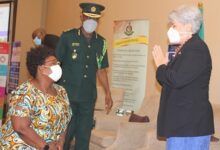There is the need for an increase in accessibility to pharmaceutical services in rural areas in the country, the Pharmaceutical Council of Ghana (PCG) has said.
It also called for a collaborative effort between government and stakeholders to implement stringent measures that would check the sources of drugs across the country and give incentives to people who would want to open up facilities in rural areas.
Speaking at a day’s workshop to disseminate findings of mapping exercise undertaken by the council in six districts in the Upper West Region in Accra yesterday, Chairperson of PCG Mrs Doris Addae-Afoakwa stated that, after the exercise, her outfit realised there was also the need for more training for Over The Counter Medicine Sellers (OTCMS) to build their capacity on how to handle drugs.
The programme was organised by the PCG in collaboration with the Pharmaceutical Society of Ghana with support from the Management Sciences for Health (MSH), a non-governmental organisation (NGO).
Mrs Addae-Afoakwa said, “From the study we also realised there were gaps in the quality of personnel handling those services. So as a council we need to look at the quality of people manning these areas.”
She cautioned operators of pharmacy shops against dealing with unaccredited wholesalers and distributors, saying the act had the tendency of harming unsuspecting members of the public.
“Buying drugs from unlicensed persons is not advisable because there are fake and substandard medicines out there, so we need to be careful we do not expose clients to dangers associated with taking fake medications. It is very important for us to join forces to deliver quality pharmaceutical care to the public,” she advised.
Mrs Addae-Afoakwa also noted that if the mapping exercise is carried out to other regions of the country, it would help PCG in crafting policies that would help in its licensing system.
In his remarks, Mr Benjamin Kwame Botwe, a pharmacist, bemoaned situations where OTCMS in underserved and rural areas were unable to give appropriate information about the medicines they sell to clients.
He assured the public that PCG would not relent in its efforts to ensure medicines that reach everybody in the country were safe and efficacious.
Mr Albert Wiredu, Deputy Registrar of PCG explained that as regulators of pharmacy practices, PCG was not unaware of goal three of the Sustainable Development Goals (SDGs) which seeks to protect the wellbeing of the populace.
BY RAISSA SAMBOU







